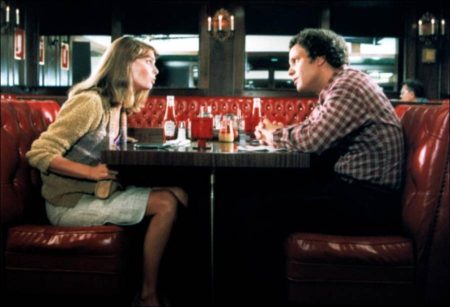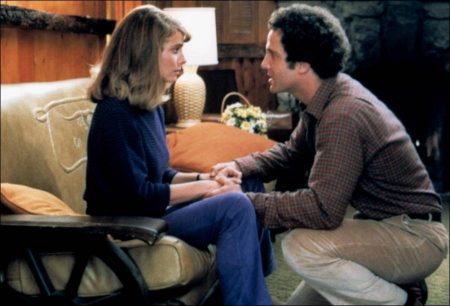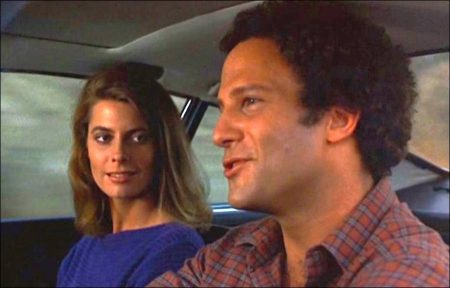Taglines: He thought dating would be easy…
Modern Romance movie storyline. Robert Cole (Albert Brooks) :, a film editor, is constantly breaking up with and reconciling with long-suffering girl friend Mary Harvard (Kathryn Harrold), who works at a bank. He is irrationally jealous and self-centered, while Mary has been too willing to let him get away with his disruptive antics. Can they learn to live with each other? Can they learn to live without each other? The movie also provides insight into film editing as Robert and co-worker Jay work on their current project, a cheesy sci-fi movie.
Modern Romance is a 1981 American comedy romance film directed by and starring Albert Brooks, who also co-wrote the script with Monica Mcgowan Johnson. It co-stars Kathryn Harrold, Bruno Kirby, George Kennedy, Albert Henderson, Jane Hallaren, Karen Chandler, Bob Einstein, Virginia Feingold, Thelma Leeds and Candy Castillo.
Bruno Kirby co-stars as Jay, Robert’s co-worker and confidant, and Brooks’ brother Bob Einstein, best known as hapless daredevil Super Dave Osborne, plays a pushy salesman at a sporting goods store. A third brother, Cliff, has a cameo in the scenes set in the recording studio. He plays the music mixer, the bald man sitting to the left of the head mixer, who gets up and goes to his car during the break.
David, the director of the film that Robert is editing, is played by real-life film director James L. Brooks – no relation to Albert. He would later return the favor by casting Albert in his Academy Award-nominated role of Aaron Altman in Broadcast News.
According to Albert Brooks, Stanley Kubrick was a big fan of the film. He tells the story that Kubrick called him after viewing the film and asked, “How did you make this movie? I’ve always wanted to make a movie about jealousy.”
Film Review for Modern Romance
e’s got a Porsche and a good-looking girl – what’s his problem?” Thus read one of the comment cards from an early focus group screening of Albert Brooks’ 1981 masterpiece Modern Romance. In a 2007 Esquire interview, Brooks described how Columbia Pictures’ initial delight with the film disintegrated into despair after the aforementioned test screening. “Add a psychiatrist scene,” studio head Frank Price told him. Brooks demanded to know why, to which Price responded “Explain it!” Not only did the demand go against everything Modern Romance was trying to do, the very notions of relatability and compromise were anathema to Brooks as a comedian and an artist.
Though already well-known as an actor through films like Taxi Driver, where he played Travis Bickle’s priggish love rival, and Broadcast News, which earned him an Oscar nomination in 1988 for Best Supporting Actor, Brooks is also one of the great American filmmakers of his generation. While his films have always attracted a certain cult following – the critic Jonathan Rosenbaum included 1979’s Real Life on his list of the top 100 American movies – they are all too frequently overlooked, especially in the UK, where availability has long been an issue. To be fair, Brooks has hardly been prolific (seven films in almost 40 years), but his work has helped shape the landscape of American comedy, from the pioneering metatextual mockumentary style of Real Life to the self-lacerating takedown of boomer narcissism in Lost in America.
The laughs in his pictures come not only from the terrific one-liners, but from Brooks’ unique sense of comic pacing – with scenes often stretched to bring out as much awkwardness as possible – as well as a self-reflexive streak that recalls his comedy antecedent Jerry Lewis. Writing about Brooks for the AV Club, Scott Tobias and Nathan Rabin argued that his comedy rests on the duality in his films between scathing satire and celebratory narcissism. Modern Romance is his masterpiece, and, not coincidentally, it is the film that best captures this duality.
Brooks himself plays Robert, a film editor who breaks up with his long-suffering girlfriend Mary (Kathryn Harrold), then worries that he’s made a huge mistake and tries to win her back. It essentially plays out as a rom-com in reverse, careening through the traditional tropes and following a common narrative trajectory, all while subverting each cliché along the way.
The central thrust of the rom-com as a genre is the pursuit of happiness – making it as American an idea as the western or the gangster picture – which usually takes the form of marriage or a lasting, monogamous relationship. The genius of Modern Romance is that it still retains this thrust, but what separates it from so many cornerstones of the genre is that this elusive happy ending is pursued through narcissism, neuroses and cruelty. The sense of hope that is integral to the rom-com – the inherent faith in the relationship being portrayed – is replaced with despair.
Robert doesn’t want Mary back because he loves her, he wants her back because he dreads the uncertainty of the future. Tobias noted how the picture forms an unlikely companion piece to Martin Scorsese’s Raging Bull, which was released the previous year. Both Robert and Jake La Motta are motivated by an unseemly combination of narcissism and self-hatred, but where the latter projects it through real violence, the former does so through passive aggression. Though the film opens with a break-up, Robert’s aim is still that of many rom-com protagonists, i.e. marriage. In this sense it’s still a quintessential rom-com at heart, but in Brooks’ hands it becomes a funny, pessimistic pursuit of unhappiness – an anti-American Dream.
The best rom-coms will often double up as theses on their own gender politics, forming an extended dialectic on the romantic dynamic between the central couple that runs alongside the primary narrative. In a critical climate where ideology is increasingly becoming the sole prism through which a picture is viewed, the inseparability of a great rom-com’s ideological and aesthetic concerns should encourage us to broaden the way we think about the genre. With this in mind, Modern Romance may be a film about male ego, but, like Elaine May’s The Heartbreak Kid or Mary Harron’s American Psycho, the execution – the directing, writing, editing – lacerates that very ego. Part of Brooks’ brilliance is in creating a monster by exaggerating certain traits that will be very real to a big proportion of his audience.
With its auteurist take on love and male neuroses, the films of Woody Allen are an obvious point of comparison when discussing Modern Romance, but the darkness that underlies the film points to more unexpected influences. Stanley Kubrick, for example, loved it, and told Brooks that it was the movie he’d always wanted to make about jealousy.
This speaks to the malleability and scale of Brooks’ comedy. The themes he was exploring could be played as a rom-com like Modern Romance, or skewed to a darker, more insidious aesthetic, like in Kubrick’s Eyes Wide Shut, the movie about jealousy he did eventually make. It shows the kind of reach that Brooks had as a filmmaker, and it’s about time he received the appreciation he deserves.
Modern Romance (1981)
Directed by: Albert Brooks
Starring: Albert Brooks, Kathryn Harrold, Bruno Kirby, George Kennedy, Albert Henderson, Jane Hallaren, Karen Chandler, Bob Einstein, Virginia Feingold, Thelma Leeds, Candy Castillo
Screenplay by: Albert Brooks, Monica Johnson
Production Design by: Edward Richardson
Cinematography by: Eric Saarinen
Film Editing by: David Finfer
Set Decoration by: James L. Berkey
Makeup Department: Carol Meikle, Christina Smith
MPAA Rating: None.
Distributed by: Columbia Pictures
Release Date: March 13, 1981
Views: 180



